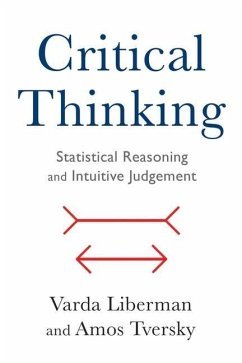In Critical Thinking, Varda Liberman and Amos Tversky examine how we make judgments under uncertainty and explain how various biases can distort our consideration of evidence. Using everyday examples, they detail how to examine data and their implications with the goal of helping readers improve their intuitive reasoning and judgment. From the courtroom to the basketball court, cholesterol count to the existence of the supernatural, Liberman and Tversky explore the fundamental insights of probability, causal relationships, and making inferences from samples. They delve into the psychology of judgment, explaining why first impressions are often wrong and correct answers go against our intuitions. Originally written in Hebrew and published by the Open University in 1996, Critical Thinking is an essential guide for students and interested readers alike that teaches us to become more critical readers and consumers of information.
Hinweis: Dieser Artikel kann nur an eine deutsche Lieferadresse ausgeliefert werden.
Hinweis: Dieser Artikel kann nur an eine deutsche Lieferadresse ausgeliefert werden.
This masterpiece is the fruit of long-term collaboration between Varda Liberman and Amos Tversky, the master of judgment and decision making. It is both a wonderful leisure read and a source of material for a fascinating undergraduate course. Readers will be inspired to think critically about their own reasoning. Some of them will likely report in a few years that this was the book that ushered them into the world of human reasoning and statistical inference. Ariel Rubinstein, Tel Aviv University and New York University

